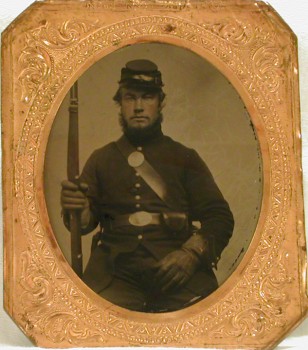William "The Sleeping Sentinel" Scott Letters
William Scott, one of Vermont's best known Civil War soldiers, gained his fame by falling asleep on guard duty, earning himself the epithet by which he is known today, "The Sleeping Sentinel."
William Scott enlisted as a private in Company K, Third Vermont Regiment, at Montpelier, on July 10, 1861. On August 31, 1861, an officer of the guard, in making his regular tour of inspection, found William Scott asleep at his post. Subsequently, Scott was court-martialed, found guilty, and sentenced "to be shot to death" on Monday, the 9th of September 1861.
 On the morning of September 9, the regiments of the Vermont Brigade were drawn up ostensibly to witness the execution of William Scott. The firing squad took its position, the prisoner was brought forth, the death sentence read, and then, a pardon was issued to the prisoner. Just eight months later, on April 16, 1862, William Scott was mortally wounded at Warwick Creek midway between Lee's Mill and Wynn's Mill, Virginia.
On the morning of September 9, the regiments of the Vermont Brigade were drawn up ostensibly to witness the execution of William Scott. The firing squad took its position, the prisoner was brought forth, the death sentence read, and then, a pardon was issued to the prisoner. Just eight months later, on April 16, 1862, William Scott was mortally wounded at Warwick Creek midway between Lee's Mill and Wynn's Mill, Virginia.
William Scott was born in Groton, Vermont, in 1839 or 1840. Today, there is a marker at the site of the Scott homestead, which is located on the road (now Route 302) between Barre and Wells River. Seventy-nine Groton men enlisted in the Union Army; 29, including William Scott and two of his brothers, died in service. William Scott's story is a classic example of how history is often rewritten. His plight was a closely followed human interest drama, reported by numerous newspapers. The event created such high interest that the story of the "Sleeping Sentinel" was printed in raised letters for the blind, a copy of which is currently in the Society's collection. As details of the story were embellished, the truth became more difficult to determine. In later years, many challenged that idea that Lincoln had pardoned Scott. However, in 1997, the original court-martial and pardon documents were discovered and authenticated. William Scott had indeed been pardoned by President Lincoln at the request of the enlisted man's regiment.
These letters written by William Scott are in the collection of the Vermont Historical Society (MS 973.732 Sc86).
- Transcriptions (pdf)